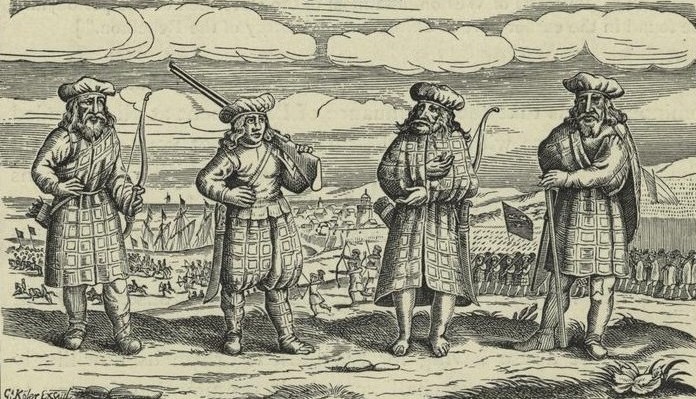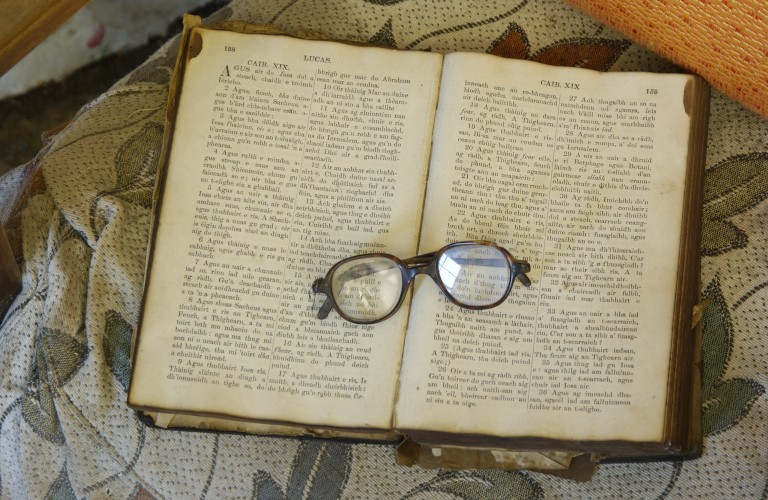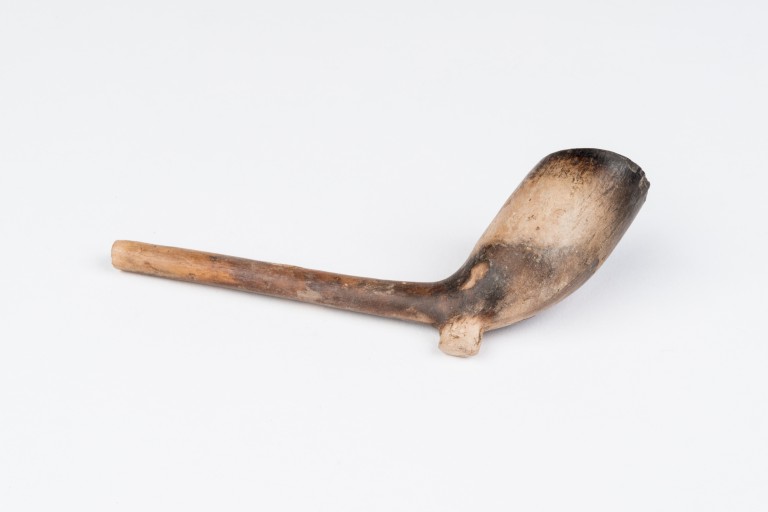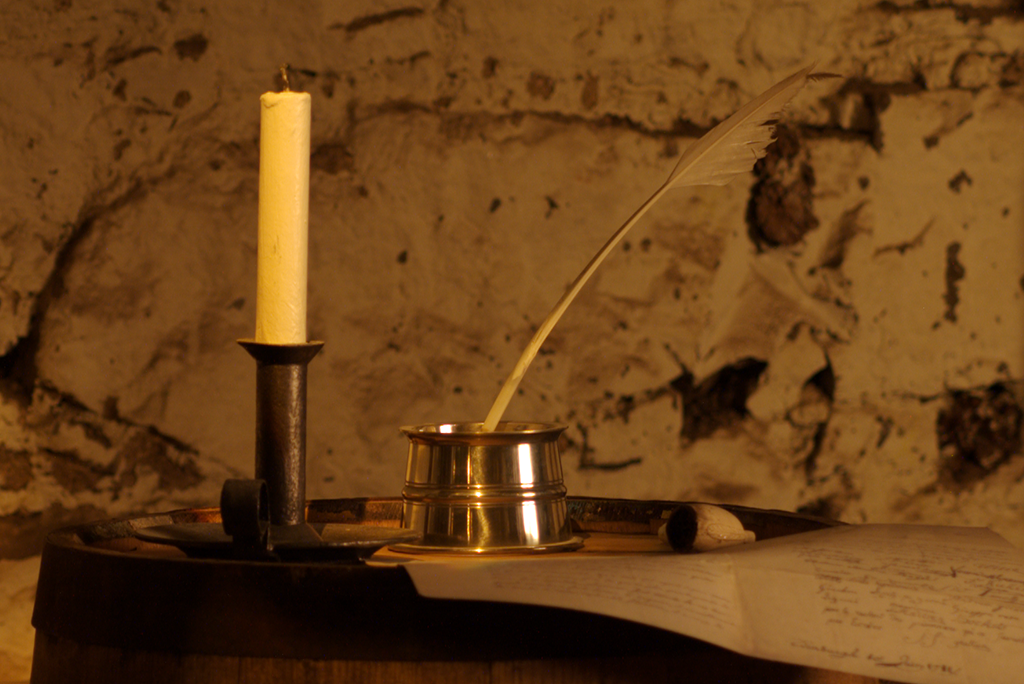Gaelic songs can tell us a huge amount about life in Scotland and the surprisingly modern ways in which Gaels saw the world. Even when working with English translations, they reveal the words and thoughts of people who are not normally visible in written histories.
Here we delve into three poems which give insight into bards and the Gaelic world they lived in.
The Highland Dress
In the aftermath of the 1745 Jacobite rebellion the government enacted the Disarming Act, which also included clauses banning the wearing of highland dress such as kilts and tartan coats.

By G Köler [Public domain], via Wikimedia Commons
Mairearad Chaimbeul, the wife of a Presbyterian minister in Ardnamurchan, wrote her protest song ‘An t-Èideadh Gàidhealach’ shortly after. Many Gaelic bards were women, and this often gave them a means of expression in public life that was unusual in 18th century society. One of her reasons for complaint was that the law affected everyone in the Highlands no matter what side they’d been on:
‘Ciod e chuir na daoine
Gun airm ach bata
‘S nach tug iad caonnag
No adhbhar bagraidh?’
‘Why have people been disarmed
Save for a cudgel
When they didn’t start a fight or threaten anyone?’
We often forget that most people in many parts of the Highlands sided with the government, not Bonnie Prince Charlie, during the Jacobite rebellions. As the wife of a minister Mairearad Chaimbeul would likely have been a strong supporter of the establishment.
The bottom line…
We often think of Gaels and Gaelic poetry as being romantic and emotional but they were just as concerned about the bottom line as anyone else:
‘Tha call aig an rìgh ann
Mas fhiach mo bharail:
Tha ‘n cusmann a dhìth air
Gun phrìs air dathan’
‘The King will be the loser here
In my opinion:
If there’s no demand for dykestuffs
He forfeits customs’
Perhaps it’s no surprise that Mairearad Chaimbeul thought of the loss of taxes – her father was a famous Gaelic Mathematician! Although perhaps she was not as unemotional as all that…
‘Siud an sgeul tha tùrsach
Le ionadh fleasgach
Nach faicear a Ghlùinean
No bac na h-iosgaid’
‘The news that many fine young men
Find the most depressing
Is that their knees will not be seen
Or their thighs either’
A War of Words Between Lexicographers
In 1773 when the famous writer of the English dictionary Dr Samuel Johnson announced he was coming to the Highlands, none could have been more excited than Seumas Mac an t-Saoir, or James MacIntyre, who was himself working on a Gaelic dictionary with a group of scholarly Gaelic gentlemen. However, he, like many in the Highlands, was outraged to read what Dr Johnson wrote about the Gaelic language upon his return:
‘It is the rude speech of a barbarous people, who had few thoughts to express… I believe there cannot be recovered… five hundred lines of which there is any evidence to prove them a hundred years old’

Mac an t-Saoir was horrified to hear Dr Johnson slander the Gaelic language and was outraged at his suggestion that the language had no written literature when it had been a written language for a thousand years. He wasn’t slow to use his own language skills:
‘Chan eil me creidsinn ga-rìreadh
Gur Iaineach friamh na béiste,
Sann a fhuaradh e le mhàthair
Ri coigreach le nàdar bhénus:
Balach gun mhodh, lomlàn miosgainn,
Tràill neo-mhiosal air fhéin e –
Is tusa an fheòil a chidh a dholaidh,
A dhùbhail boladh, air bréinid’
‘In truth I do not really believe that this creature’s a true son of John,
It’s to some stranger his mother bore him
Through the natural laws of Venus:
A discourteous churl, full of malice.
He’s a slave with no self-respect –
You’re a heap of flesh that’s gone off,
Always smelly, now with twice the stench’
It’s a great irony that Dr Johnson, a man who claimed Gaelic had no real literature, gifted a fine collection of song, poetry, and slander against himself behind to the Highlands!
In dispraise of the pipe
Gaelic bards were not shy in getting involved in the big debates of the day, which were shaping discourse across the British Empire and beyond.
In the 1880s, Domhnall Dubh, from Strath Braan in Perthshire, penned ‘mi-mholadh Pìob thombac’, ‘In Dispraise of the Tobacco Pipe’ as part a wider debate about smoking.

The arguments in it are surprisingly familiar to discussions about smoking today, and show that people were aware of the health risks long before they were discovered by modern medicine.
‘Gur Lachdann am maol, le casan ro chaol,
neul an aoig tha comhl’ righ’
bu duine gun chiall thug camhachd di riamh
‘S ann aige bha miann na gòraich
Chan eil oisinn no iùc an sporran gu chùl
Às nach toie I gu dlùth na gròtan
‘S nan dèanadh I feum ach ceò chur ri speur
Cha chunntainn fhèinn an corr rith’
‘A discoloured forehead and undernourished limbs, along with a deathly hue, only a senseless man has surrendered his power to it! Isn’t he a man whose wishes are foolish?
There is no corner or nook or anywhere in a sporran from which it will not extract money, and it was never of any use, except for sending smoke skywards; I make no further account of it!’
Translations of ‘An t-Èideadh Gàidhealach’, the Highland Dress, and Òran don Ollamh MacIain, song to Dr Johnson by Ronald Black. Translation of ‘mi-mholadh Pìob thombac’ ‘In Dispraise of the Tobacco Pipe’ by Michael Newton.

